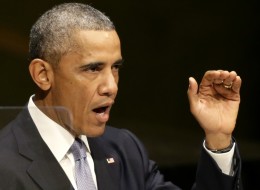 WASHINGTON -- The U.S. military operations targeting Islamic State
militants in Iraq and Syria have already cost taxpayers between $780 and
$930 million, according to an analysis by an independent think tank.
WASHINGTON -- The U.S. military operations targeting Islamic State
militants in Iraq and Syria have already cost taxpayers between $780 and
$930 million, according to an analysis by an independent think tank.The Center for Strategic and Budgetary Assessments issued a new report Monday assessing how much the military campaign has already cost (through Sept. 24) and how much more will likely be spent in the coming months.
CSBA estimates that if the current pace of operations continues, the United States could spend between $200 and $320 million a month, in a conservative estimate assuming a "moderate level of air operations and 2,000 deployed ground forces."
The United States in June began stepping up support for Iraqi and Kurdish forces fighting the Islamic State -- also known as ISIS -- in Iraq. It has been striking targeted sites in Iraq since early August and began bombing locations in Syria on Sept. 23.
The costs of the military campaign could, of course, increase if the operation escalates. The report estimates potential costs for an expanded air campaign as well as for a much more significant deployment of ground troops. "If air operations are conducted at a higher pace and 5,000 ground forces are deployed, the costs would be between $350 and $570 million per month," write the report's authors.
Regarding the third and most extensive option, which the authors term "Boots on the Ground," the report predicts: "If operations expand significantly to include the deployment of 25,000 U.S. troops on the ground, as some have recommended, costs would likely reach $1.1 to $1.8 billion per month."
"On an annualized basis, the lower-intensity air operations could cost $2.4 to $3.8 billion per year, the higher-intensity air operations could cost $4.2 to $6.8 billion per year, and deployment of a larger ground contingent could drive annual costs as high as $13 to $22 billion," they conclude.
Here's the chart from CSBA's report:

Gordon Adams, a professor of U.S. foreign policy at American University and former Office of Management and Budget official, recently conducted a separate analysis and estimated that the fight against the Islamic State will cost more than $1 billion per month, or between $15 and $20 billion per year.
Last week, Pentagon Press Secretary Navy Rear Adm. John Kirby said his "best estimate" for the operations' current cost is "between $7 million and $10 million per day," or about $210 million to $300 million per month. That figure is far lower than Adams' estimate and on the low end of CSBA's projections.
Despite the high cost of the operation, Congress left for its recess without actually voting on whether Obama has the authority to carry out the military campaign.
The Obama administration has insisted the president has this authority under two separate Authorizations for Use of Military Force. The first authorization, from 2001, gave the president the authority to "use all necessary and appropriate force against those nations, organizations, or persons he determines planned, authorized, committed, or aided the terrorist attacks that occurred on September 11, 2001." The 2002 AUMF, which authorized the war in Iraq, addressed the threat allegedly posed by Saddam Hussein.
Critics have said that these authorizations are outdated and are not sufficient to justify the current airstrikes. (Obama himself has called for the repeal of the 2001 AUMF.) Several lawmakers have been pushing for a separate authorization for the latest airstrikes and have criticized their colleagues for leaving town. House Speaker John Boehner (R-Ohio), however, has said he would prefer to wait until next year for a war debate rather than conduct it in the lame-duck session of Congress that will follow the November elections.
“Doing this with a whole group of members who are on their way out the door, I don’t think that is the right way to handle this,” he recently told The New York Times.
Original Article
Source: huffingtonpost.com/
Author: Amanda Terkel
No comments:
Post a Comment